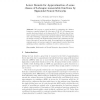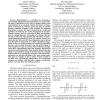553 search results - page 41 / 111 » A General Theory of Additive State Space Abstractions |
AGI
2011
13 years 8 days ago
2011
What set of concepts and formalizations might one use to make a practically useful, theoretically rigorous theory of generally intelligent systems? We present a novel perspective m...
CDC
2010
IEEE
13 years 3 months ago
2010
IEEE
Abstract-- We consider reinforcement learning, and in particular, the Q-learning algorithm in large state and action spaces. In order to cope with the size of the spaces, a functio...
IROS
2009
IEEE
14 years 3 months ago
2009
IEEE
Abstract— Previous work [1] shows that the movement representation in task spaces offers many advantages for learning object-related and goal-directed movement tasks through imit...
IWANN
2009
Springer
14 years 1 months ago
2009
Springer
We propose a general method for estimating the distance between a compact subspace K of the space L1 ([0, 1]s ) of Lebesgue measurable functions defined on the hypercube [0, 1]s ,...
TEC
2008
13 years 8 months ago
2008
Fingerprinting is a technique for generating a representation-independent functional signature for a game playing agent. Fingerprints can be used to compare agents across represent...


